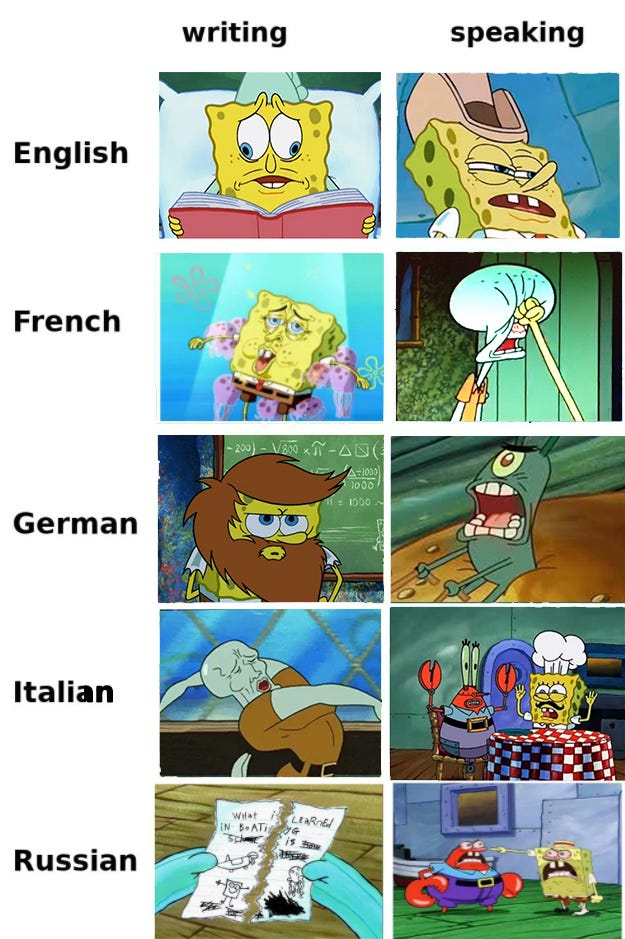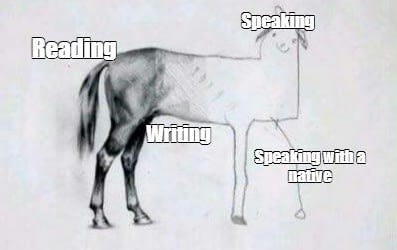Starting a New Language in 2024
Second language strategies to help you hit your stride when starting to learn a new language
Welcome, aspiring polyglot! Whether you are new around here or not, your goal is likely to learn a new language. If you have been putting that off, this is your call to action. From choosing a language to laying a solid foundation, we will cover everything you need to maximize your second language acquisition in 2024. Language learning requires time and effort, no matter how you approach it and independent of your individual learning style.
The truth is, discipline and progressive overload are all you really need to develop your language skills. That said, there are plenty of other things you should at least think about when you develop a language learning framework for yourself. As you are getting started, one of the most important decisions you will make is also one of the least consequential. First and foremost you must pick a language to learn.
Choosing a language
When it comes to choosing a language, it is largely inconsequential because you can change it up at any time. If you get tired of one language you can move to another. Should you find that the resources around you are more limited than you thought, pick up a new language instead.
New opportunities opening up often indicate an opportunity for you to jump into a different foreign language and maximize your potential. With that in mind you are going to want to look at a couple different things before making a definitive choice. Aside from simply loving a language, the next best reason to start language learning is for the utility.
The best way to learn a new language is to use it. When you have the chance to use your target language every day, language learning becomes easy and for that reason utility is vital. Every native speaker of a language is an opportunity to practice. More native speaking people means more opportunities to practice.
This includes in work and school. There are jobs that require candidates be bilingual. Learning a new language for a salary boost or a leg up in academia is excellent. For more on the advantages associated with bilingualism, make sure to check out this article:
Advantages of Being Bilingual
Welcome, budding polyglot! Learning a second language is worth it for the nootropic benefits alone, but those are far from the only benefits. Something I learned as I’ve gotten deeper and deeper into the working world is that speaking a second, third, fourth, and even fifth language is incredibly beneficial. From an increase in salary to an increase in …
Aside from the utility of the foreign language you are targeting, you are going to want to have access. Whether they are specialized markets or communities that have organized together in specific areas, having access to people you can practice with is vital. Without people to speak with, developing any communication strategies will be next to impossible.
You need to experience conversations and hear words and grammar rules in a variety of contexts in order to ensure successful second language acquisition. Language learning in the classroom might feel like a solo endeavor, but true second language acquisition is not. Place an emphasis on access to your target language when you are deciding precisely what it should be.
Finally, the most and least important, your interest. At the beginning of learning a new language, it is going to be enjoyable. You will learn new words, you will master some basic phrases, you may even write some full length sentences. After a while, though, that initial motivation will dwindle. That is when it becomes important that you have an interest in the language.
When you focus on doing things you are interested in you will not have to fight yourself to come back and study the next day. Fluency is a matter of months, years even, not days and weeks. Pick a language you are interested in, that you have access to, and ideally one that will serve you in the future for your career or potential love life.
Mastering the alphabet
Once you have chosen a language, you get to enjoy the slog of learning a new alphabet. Your language skills and fluency is heavily dependent on the foundation you lay in the beginning. At the very base of that foundation is going to be the alphabet. Spend time placing earnest focus on understanding the intricacies of the alphabet and how the letters interact with one another. Letters are the building blocks and if you know them well, vocabulary words will be easy for you to collect later down the line. As you are doing that, though, you are going to want to be able to pronounce them.
Phonics are an elite tool you have available to you as you tackle learning a new language. Understanding how letters interact with one another to make specific sounds is vital. Isolate different things and hone in on the patterns across languages. Think about all of the different combinations and listen closely to discern the differences between things that are very similar.
During this time you are going to want to place a heavy emphasis on listening comprehension. You need to tune your ear if you want to master the language and the longer you wait to do so the more difficult it will be. Writing everything down will ensure you are able to recall more and maintain momentum for longer. Not only that, but you will also have something to look back on and a place to track the patterns you are learning.
Patterns to assist your second language acquisition
There are hundreds of patterns lying in wait within every language to be discovered. Finding those patterns and using them will help you develop your language skills. This is particularly true when it comes to vocabulary words. Learning the etymology of words can open the door to adding several new vocabulary words to your base. Writing all of these things down is vital, do it from the beginning. As you are looking at different patterns, make sure you also take time to study the loan words.
Loan words are words that are used in multiple languages. Some examples in English are, encore, rendez-vous, salsa, gesundheit, kindergarten, and cliché. Finding these words in your target language is an easy way to stack a big win as you get rolling. When you focus on the things you already know you give yourself a better chance at retaining new knowledge. Write down all of the key words you come across as you are searching and practice using them in sentences. Track basic phrases and do what you can to continuously expand your vocabulary as rapidly as possible.
A large vocabulary provides you with the ability to express yourself as accurately and eloquently as possible. It is easier to work through grammar errors than it is to work through situations in which the correct usage of different words has escaped you. The more verbs, nouns, and descriptive words you know the more enjoyable your language learning journey to fluency will be.
While there are not necessarily beginner activities, there are some things that are more consumable when you are a novice. The best language learners have a myriad of resources they use to study. Successful second language acquisition is heavily dependent on discipline and consistency, but having interesting resources on hand makes it easier.
Beginner activities that will hone your language skills
The best thing about foreign languages is that anything you can find in you first language you can likely find in your target language. Meaning anything you would have used at the beginning of your first language acquisition you can also you when you are starting out on your second language acquisition. Comprehensible input can mean anything, but some of the materials that are the most overlooked offer people the best opportunity to advance. Not only that, but there is nothing quite so good for self evaluation as testing your ability against these things:
1. Nursery rhymes
2. Comics
3. TV Shows
Starting out with nursery rhymes allows you to do a couple of things. First, they allow you to get a look at the base of language that most people start out with when learning their first language. Having common ground with other native speaking people has high roi in the short and long term. That is the reason comics and tv shows are also so helpful. At one point or another you will run into someone who has seen or read the same things as you. When that happens conversations naturally flow and you can practice your new language in real time.
Beyond nursery rhymes giving you the advantage of connecting with native speaking people, they also give you a great way to stay engaged while learning. For the most part, these stories are short and easy to read, but they have a profound message. You will be able to filter out one or two incredible lines to work with and memorize. However, if you want to avoid having to memorize things you are going to want to be writing.
Keep a running log of everything you are working with and where you leave off at the end of the language learning session. Write down every new word you come across and what it means. Speak it aloud and ensure you understand both the pronunciation and meaning across contexts. Use listening comprehension time to explore new forms of art and to hone your language skills. Basic grammar is vital for fluency, so ensure your base is strong by learning the same way natives do. Expand your knowledge while make example after example of how to best use different components.
Conclusion
There are dozens of reasons to learn a new language. From the brain health factors to the potential career opportunities. Whatever brought you to the conclusion that you wanted to learn a foreign language, now is the best time to start. It is not uncommon for people to like the idea of learning a foreign language more than the actual process of doing it. This is enough to stop the average language learner in their tracks. A good language learner will ensure that they have ample resources to return to and work with along with learning strategies they can leverage to make the most of the stimuli.
Building a strong foundation is vital for your success. None of the language learning strategies in the world can help you if you do not have a foundation upon which to build. Writing things down will ensure all of the things you are learning are locked in and ready to recall when necessary. Use the language and you will find that it does not take years to learn a language, contrary to what the public education system would have you believe. More importantly, if you do these things you may just realize how enjoyable learning a foreign language can be.
It is not impossible to learn a language fast, but if that is the goal it is imperative to understand that it will be difficult. Picking up a foreign language at any speed is going to be challenging. But you can do difficult things and be great. So go do difficult things and become great. I will be here by your side endeavoring to do the same. I'll be here rooting for you and watching out for your successes in the meantime.
For more content check out Second Language Strategies dot com or find me on Twitter or Instagram. If you are struggling to get speaking in your target language, get up to 55% off a Babbel subscription using this link. I look forward to seeing everyone’s progress in the months and years to come. Don't forget to check out the YouTube channel as well!








